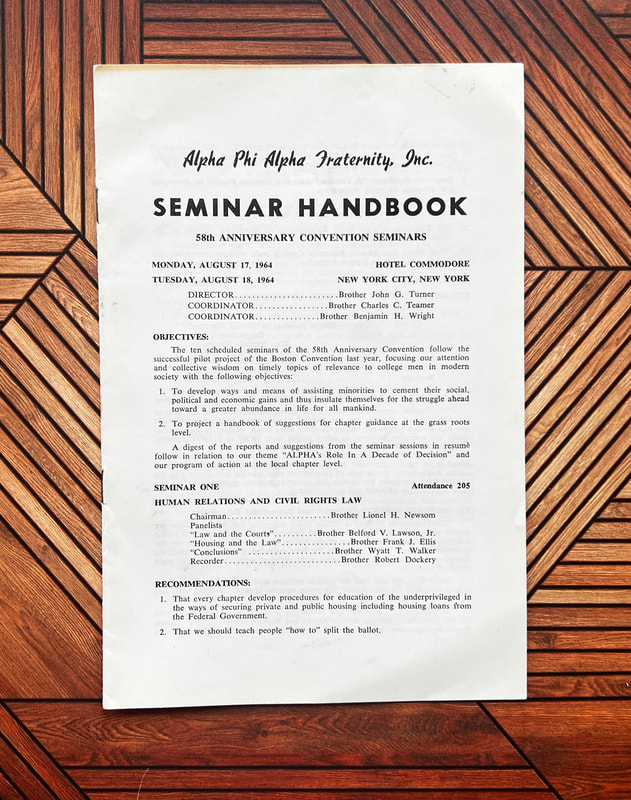CR439
Alpha Phi Alpha Fraternity
58th Anniversary Seminar Handbook
August 17-18 1964
Alpha Phi Alpha Fraternity Incorporated is the first intercollegiate Greek-letter fraternity established for African Americans. It was founded on December 4, 1906, at Cornell University in Ithaca, New York, by seven men: Henry Arthur Callis, Charles Henry Chapman, Eugene Kinckle Jones, George Biddle Kelley, Nathaniel Allison Murray, Robert Harold Ogle, and Vertner Woodson Tandy.
The fraternity was created in response to the exclusion of African American students from other fraternities and social organizations. Its founders sought to establish an organization that would promote academic excellence, leadership, and service, while also providing a supportive network for African American students.
In its early years, Alpha Phi Alpha faced challenges and discrimination, but it quickly grew in size and influence. The fraternity established chapters at other colleges and universities across the United States, and its members became leaders in their communities and in the larger civil rights movement.
Over the years, Alpha Phi Alpha has expanded its focus to include social and political activism, community service, and philanthropy. The fraternity has been involved in a wide range of initiatives, including voter registration drives, mentoring programs for young people, and efforts to address health disparities in African American communities.
Today, Alpha Phi Alpha has more than 800 chapters and over 200,000 members worldwide, making it one of the largest and most influential African American organizations in the world. Its members continue to work towards its founding principles of scholarship, leadership, and service, while also advocating for social justice and equality for all people.
The fraternity was created in response to the exclusion of African American students from other fraternities and social organizations. Its founders sought to establish an organization that would promote academic excellence, leadership, and service, while also providing a supportive network for African American students.
In its early years, Alpha Phi Alpha faced challenges and discrimination, but it quickly grew in size and influence. The fraternity established chapters at other colleges and universities across the United States, and its members became leaders in their communities and in the larger civil rights movement.
Over the years, Alpha Phi Alpha has expanded its focus to include social and political activism, community service, and philanthropy. The fraternity has been involved in a wide range of initiatives, including voter registration drives, mentoring programs for young people, and efforts to address health disparities in African American communities.
Today, Alpha Phi Alpha has more than 800 chapters and over 200,000 members worldwide, making it one of the largest and most influential African American organizations in the world. Its members continue to work towards its founding principles of scholarship, leadership, and service, while also advocating for social justice and equality for all people.
.



